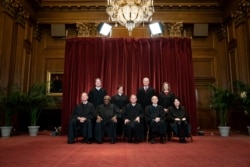The United States Supreme Court has again placed itself in the middle of America’s most divisive issues.
Last week, the nation’s highest court agreed to hear a case on the admissions policies of Harvard University and the University of North Carolina. The two universities use race as one of many things they consider in admissions decisions. A ruling against the universities, however, could seriously damage affirmative action.
Affirmative action is a practice or policy of helping individuals belonging to groups known to have been discriminated against previously. It is a policy long criticized by conservative Americans.
The court has already reviewed cases looking to restrict abortion rights and expand gun rights. Both are major goals of conservatives.
The court’s rulings on abortions and guns will come in June. And a ruling in college admissions is expected next year.
A more forceful court
The court has become more forceful since the addition of Justice Amy Coney Barrett. She was the third conservative justice nominated by former President Donald Trump.
Barrett’s seat gave the nation’s highest court a 6-3 conservative majority and changed its balance of power.
"This particular six-justice majority seems willing to push ahead in an aggressively conservative direction on multiple fronts,” said Elizabeth Wydra. She is president of the liberal group Constitutional Accountability Center.
She added that the majority is ignoring the ideas of judicial restraint and stare decisis.
Judicial restraint leaves policy-making decisions to the executive and legislative branches of government. And stare decisis is the legal belief of respecting past court rulings.
Observers say that based on oral arguments from a case brought by the state of Mississippi last year, the court's conservatives seem prepared to weaken or even overturn the 1973 Roe v. Wade decision. The Roe v. Wade ruling effectively legalized abortion in the U.S. The court also appeared ready to rule against a New York state law that limits the right to carry guns in public.
Others say the court’s willingness to hear these cases is a sign of how the conservative majority is moving the court to the political right.
‘Political appearance’
Four justices are needed for the Supreme Court to hear a case. And it has at least that many who are not worried about being seen as politically motivated, said Joshua Wilson. He is a professor at the University of Denver and is an expert on conservative law and politics.
"Given the political appearance” of the kinds of cases they hear, “it's all the more remarkable given that they have to know how much the public is paying attention," Wilson said.
The high court’s conservative majority has been critical of the power of federal agencies. The action could be described by conservatives as a “war on the administrative state.”
The court, for example, this month blocked the Biden administration's COVID-19 vaccination-or-testing requirement for companies with at least 100 workers. The justices also heard two cases challenging environmental laws aimed at reducing air and water pollution. They did so even though Biden's administration asked them to wait while agencies write new rules.
Ian Fein is a lawyer with the Natural Resources Defense Council environmental group. He said the court was "incredibly aggressive" in taking up the two cases.
The court also seems to support religious rights. It has ruled in favor of religious groups challenging COVID-19 restrictions. And last week, the court heard a case from Maine that could expand public funding of religious groups.
I’m Dan Novak.
Reuters reported this story. Dan Novak adapted it for VOA Learning English. ____________________________________________________________
Words in This Story
aggressive — adj. using forceful methods to succeed or to do something
multiple — adj. more than one
motivate — v. to give a reason for doing something
remarkable — adj. unusual or surprising
challenge — v. to question the action or authority of
incredible — adj. difficult or impossible to believe






